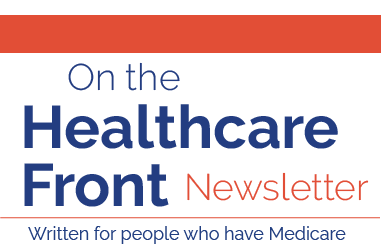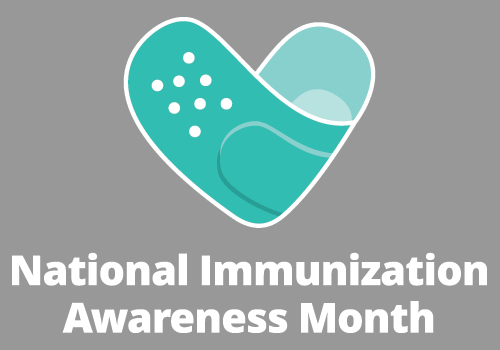
|
Issue #28 August 2024 Newsletter issues will tell you about Acentra Health’s free services for people who have Medicare. They also contain important information from Medicare and other health-related tips. Do you receive email reminders when new issues of On the Healthcare Front are published? |
when should you call acentra health?
- If you are not ready to be discharged from the hospital.
- If your Medicare skilled services are ending too soon. Examples of skilled services include things like physical therapy and nursing services.
- If you have a concern about the quality of care you received.
- If you have a concern about your medical care that needs to be taken care of right away.
To learn more about our free services, you can watch a video or read more on our Overview of Services for People who Have Medicare page on our website.
Click on the link below for the phone number for your state. These services are free for people who have Medicare.
august is national immunization awareness month
Immunization is important because it helps protect us and those around us from serious diseases. Becoming immune or resistant to certain diseases can start by getting vaccines, which teach our bodies how to fight off infections.
The Centers for Disease Control and Prevention (CDC) website has information about vaccines and immunization.
National Immunization Awareness Month is a time to focus on immunization and the vaccines that you may need to keep yourself healthy. Talk with your doctor about what is right for your health care. If you have questions about what Medicare covers, visit www.medicare.gov or call 1-800-MEDICARE (1-800-633-4227).

pain doesn’t have to be a normal part of aging
Regrettably, many older adults have physical pain. While some aches and pains can happen as your body changes with age, constant or severe pain isn’t something you should just accept.
While there are many reasons why, as an older adult, you might feel pain, it is crucial to figure out what is causing it.
It's important to talk to your doctor about it. Start by describing the pain. You should talk about where it is, how it feels, and how long you’ve had it. Tell your doctor if the pain is sharp, dull, constant, or comes and goes. Be honest about how the pain affects your daily life and if anything makes it better or worse. Your doctor might ask questions and run tests to figure out the cause. Together, you can determine if there is a serious problem and talk about the best ways to manage and treat the pain. The ultimate goal is to help you feel better so you can stay active.
If you’re hesitant about talking with your doctor, you may find the following websites regarding managing pain useful.
The National Institute on Aging, an official website of the United States government, has a webpage dedicated to the topic of pain. The page includes facts about types of pain, talking with your doctor, and ways to treat pain.
From the National Council on Aging: Exploring the Link Between Chronic Pain and Mental Health in Older Adults talks about common causes of chronic pain and their effects.
The National Library of Medicine, Author Manuscript: The silent epidemic of chronic pain in older adults talks about the burden of suffering with pain on your own.
do you know someone who might enjoy this newsletter?
Pass along this link to your friends so they can read the newsletter — On the Healthcare Front — and how to sign up.
Here is the link you can copy and share with friends: www.acentraqio.com/ohf
in this issue:
health observancemedicare and natural disasters |
pain and older adultsshare with friends |
what to know about using your medicare during a hurricane

The National Weather Service outlook for the 2024 Atlantic hurricane season, which spans from June 1 to November 30, talks about an 85% chance for an above-normal season. That could mean more hurricanes!
As someone who has Medicare, you should know how your Medicare works during these times to make sure you can get the care you need.
getting your medications, medical equipment, and supplies
If you have to leave your home because of a hurricane, you might be worried about running out of your medications. Fear not, as Medicare Part D and Medicare Advantage plans with prescription drug coverage allow you to get your medications from another pharmacy. This means you can fill your prescriptions at a different pharmacy than usual if you need to.
If you need to speak with someone about where you can get your medications, generally, you can find your plan's contact information on your plan membership card. You can also call 1-800-MEDICARE.
If you use medical equipment like oxygen tanks, wheelchairs, or diabetes testing supplies, these items could get lost or damaged during the hurricane. However, Medicare can help replace them. You can call your supplier to get new equipment, or if your usual supplier isn’t available, you can find a different one.
getting the care you need
During a hurricane, your regular doctor or healthcare provider might not be available. Thankfully, if this happens, you can see another doctor who accepts Medicare. This ensures that you can still get the medical care you need even if you are away from home or if your usual healthcare facility or doctor’s office is closed. If you have a Medicare Advantage Plan, check your plan's website or contact your plan to find out if there are temporary changes to its rules during a declared emergency or disaster.
Please note that if you need urgent medical care during a hurricane, go to the nearest hospital or clinic. Medicare covers emergency services. This allows you to focus on quickly getting any needed medical help. (Be sure to read the article in the MEDICARE NEWS section below about getting care in an emergency room.)
staying informed
Stay up to date with information from local authorities and Medicare. Medicare's website can give you details about your coverage and what steps to take during a natural disaster such as a hurricane. You can also call Medicare at 1-800-MEDICARE (1-800-633-4227). TTY users can call 1-877-486-2048.
By knowing how your Medicare works during a natural disaster, you can have peace of mind and focus on staying safe. Remember, Medicare is there to help you get the care and medications you need, no matter what happens!
|
Read more: Visit the Getting care in a disaster or emergency page on Medicare’s website where important facts are highlighted, such as the numbers to contact when your hometown has been impacted. Information also includes using Medicare Advantage in emergency situations. Acentra Health has social workers and representatives to help resolve concerns quickly through Immediate Advocacy. There are hurricane resources on our website for southeastern states as well as states in the Gulf of Mexico. Simply go to www.acentraqio.com, scroll down to the US map, and click on your state. |
medicare news

Staying informed about the latest Medicare news is important because changes can affect your coverage, benefits, and costs. Whether you’re new to Medicare or have been using it for years, this information will help you make the best choices for your healthcare needs.
medicare prescription payment plan
For the first time, beginning in 2025, the prescription drug law, known as the Inflation Reduction Act, will require all Medicare prescription drug plans (Medicare Part D plans) — including both standalone Medicare prescription drug plans and Medicare Advantage plans with prescription drug coverage — to offer you the option to pay out-of-pocket prescription drug costs in the form of capped monthly payments instead of all at once at the pharmacy.
inflation reduction act and medicare
The Inflation Reduction Act provides meaningful financial relief by improving access to affordable treatments and strengthening the Medicare program both now and in the long run. The new drug law made improvements to Medicare that will expand benefits, lower drug costs, keep prescription drug premiums stable, and improve the strength of the Medicare program.
Visit the Medicare Prescription Drug Affordability page of the CMS website for more information, such as changes to Medicare Parts D and B.
you have the right to care in an emergency room. it’s the law.
Following the Supreme Court’s decision in Moyle versus the United States, a letter was sent to hospitals and provider associations across the country on July 2, 2024. The letter reminded them that it is a hospital’s legal duty to offer necessary stabilizing medical treatment (or transfer, if appropriate) to all patients in Medicare-participating hospitals who are found to have an emergency medical condition.
There is information on the Emergency Room Rights page of the CMS website to help you learn about your rights under the Emergency Medical Treatment and Labor Act (also referred to as EMTALA) and how to submit a complaint if you’re denied emergency medical care.

More information: Listen to our podcast Episode 25: Medicare 101 - Learn About the Basics of Medicare This episode will talk about Medicare basics, including facts about Medicare Parts A, B, C (Medicare Advantage), and Part D (prescription drug plan). Our guest is Juan Garcia, who is a health insurance specialist for CMS. |
Publication No. R146810-73-08/2024. This material was prepared by Acentra Health, a Medicare Quality Improvement Organization under contract with the Centers for Medicare & Medicaid Services (CMS), an agency of the U.S. Department of Health and Human Services. The contents presented do not necessarily reflect CMS policy.





